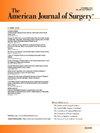在线 LGBTQ+ 支持在普外科住院医师培训项目中的代表性。
IF 2.7
3区 医学
Q1 SURGERY
引用次数: 0
摘要
背景:女同性恋、男同性恋、双性恋、变性人、同性恋及更多(LGBTQ+)受训者在医学界的代表性不足,而他们在外科的经历尚未得到充分研究。我们试图研究各地区普外科住院医师培训项目在LGBTQ+在线支持方面的做法:方法:对100个普外科住院医师培训项目进行回顾性双人审查,按住院医师电子申请服务(ERAS)地区进行分层,比较多元化、平等与包容(DEI)和LGBTQ+特定网页的数据:结果:中大西洋和南大西洋地区各有20%的项目,其他地区的项目较少。在 100 所院校中,92% 的院校拥有 DEI 网页,43% 的院校拥有 LGBTQ+ 专属网页。如果按地区进行比较,项目成为 "人权运动(HRC)LGBTQ+领导者 "的可能性存在明显差异(P结论):很少有普外科住院医师培训项目在网上分享针对LGBTQ+的DEI内容,且没有地区差异。更新网站以突出 LGBTQ+ 的包容性等建议应有助于招聘多样化的外科住院医师,并为未来的住院医师创造一个受欢迎的环境。本文章由计算机程序翻译,如有差异,请以英文原文为准。
Representation of online LGBTQ+ support in general surgery residency programs
Background
Lesbian, Gay, Bisexual, Transgender, Queer, and more(LGBTQ+) trainees are underrepresented in medicine, and their experiences in surgery have not been well studied. We sought to examine the practices of general surgery residency programs by region regarding representation of LGBTQ+ support online.
Methods
Retrospective, two-person review of 100 general surgery residency programs stratified by Electronic Residency Application Service(ERAS) region comparing data on Diversity, Equity, and Inclusion(DEI) and LGBTQ+ -specific webpages.
Results
The Middle Atlantic and South Atlantic regions had 20% of programs each, with fewer programs found in other regions. Of the 100 institutions, 92% had DEI webpages, and 43% had LGBTQ+ -specific webpages. There was a significant difference in the likelihood of a program being an Human Rights Campaign(HRC) LGBTQ+ leader when compared by region(p < 0.01).
Conclusions
Few general surgery residency programs share LGBTQ+-specific DEI content online with no regional difference observed. Recommendations such as updating websites to highlight LGBTQ+ inclusion should aid recruitment of a diverse, surgical residency as well as create a welcoming environment for prospective residents.
求助全文
通过发布文献求助,成功后即可免费获取论文全文。
去求助
来源期刊
CiteScore
5.00
自引率
6.70%
发文量
570
审稿时长
56 days
期刊介绍:
The American Journal of Surgery® is a peer-reviewed journal designed for the general surgeon who performs abdominal, cancer, vascular, head and neck, breast, colorectal, and other forms of surgery. AJS is the official journal of 7 major surgical societies* and publishes their official papers as well as independently submitted clinical studies, editorials, reviews, brief reports, correspondence and book reviews.

 求助内容:
求助内容: 应助结果提醒方式:
应助结果提醒方式:


